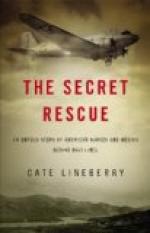“You might have let me into it,” he grumbled.
But Neil explained and apologized until at length peace was restored. Then he had to tell Paul all about it from first to last, and Paul laughed until he choked; “I—I just wish—wish I had—seen Cowan’s—face when—he—found it—out!” he shrieked.
One result of that night’s adventure was that the Class of 1905 was never thereafter bothered in the slightest degree by the sophomores; it appeared to be the generally accepted verdict that the freshmen had established their right to immunity from all molestation. Another result was that Neil became a class hero and a college notable. Younger freshmen pointed him out to each other in admiring awe; older and more influential ones went out of their way to claim recognition from him; sophomores viewed him with more than passing interest, and upper-class men predicted for him a brilliant college career. Even the Dean, when he passed Neil the following afternoon and returned his bow, allowing himself something almost approaching a grin. Neil, however, bore his honors modestly even while acknowledging to himself the benefit of them. He learned that his chances of making a certain society, membership in which was one of his highest ambitions, had been more than doubled, and was glad accordingly. (He was duly elected and underwent rigorous initiation proudly and joyfully.)
The kidnaping affair even affected his football standing, for Mills and Devoe and Simson, the trainer, spoke or looked applause, while the head coach thereafter displayed quite a personal interest in him. Several days subsequent to the affair Neil was taking dummy practise with the rest of the second eleven. Mills had appropriated the invention of a Harvard trainer, rigging the dummy with hook and eye-bolt, so that when properly tackled the stuffed canvas effigy of a Robinson player became detached from its cable and fell on to the soft loam much after the manner of a human being. But to bring the dummy from the hook necessitated the fiercest of tackling, and many fellows failed at this. To-day Neil was one of this number. Twice the dummy, bearing upon its breast the brown R of Robinson, had sped away on its twenty-foot flight, and twice Neil had thrown himself upon it without bringing it down. As he arose after the second attempt and brushed the soil from his trousers Mills “went for him.”
“You’re very ladylike, Fletcher, but as this isn’t crewel-work or crochet you’ll oblige me by being so rude as to bring that dummy off. Now, once more; put some snap into it! Get your hold, find your purchase, and then throw! Just imagine it’s a sophomore, please.”
The roar of laughter that followed restored some of Neil’s confidence, and, whether he deceived himself into momentarily thinking the dummy a sophomore, he tackled finely, brought the canvas figure from the hook, and triumphantly sat on the letter R.
Signal practise followed work at the dummy that afternoon, and last of all the varsity and second teams had their daily line-up. Neil, however, did not get into this. Greatly to his surprise and disappointment McCullough took his place at left half, and Neil sat on the bench and aggrievedly watched the lucky ones peeling off their sweaters in preparation for the fray. But idleness was not to be his portion, for a moment later Mills called to him:




